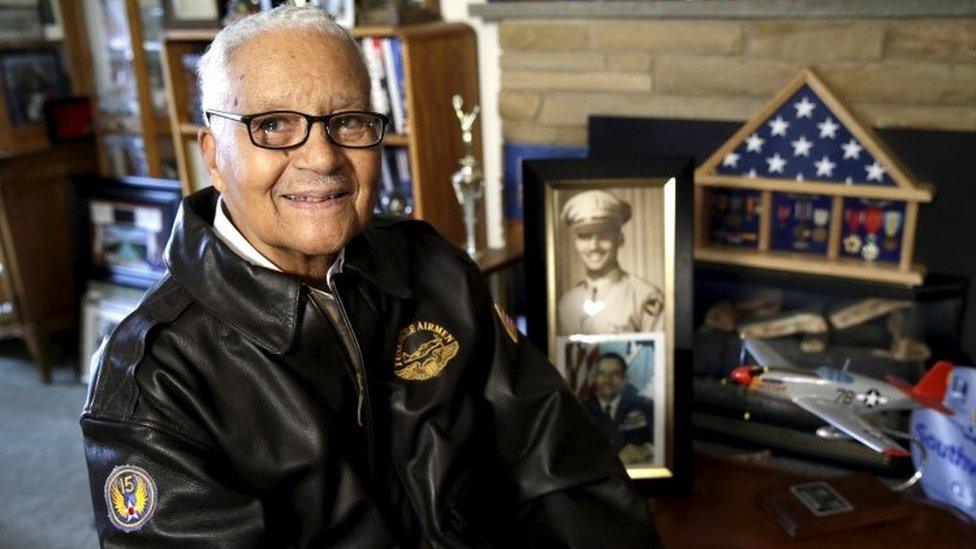Pioneering US military pilot Charles McGee dies at 102
- Published

Charles McGee flew 409 combat missions during World War Two and the Korean and Vietnam conflicts
Charles McGee, a highly decorated American pilot who battled racism and segregation in the military, has died aged 102.
He passed away in his sleep on Sunday morning, his family said. "He had his right hand over his heart and was smiling serenely," a statement read.
A member of America's first all-black aviation unit, McGee flew more than 400 missions during a two-decade career.
He served in World War Two, as well as the Vietnam and Korean conflicts.
"Today, we lost an America hero," US Secretary of Defence Lloyd Austin said on Sunday. "While I am saddened by his loss, I'm also incredibly grateful for his sacrifice, his legacy and his character."
McGee, a retired brigadier general, was called to service in 1942 at the age of 23. He became one of the first black military aviators, and his unit was known as the Tuskegee Airmen.
During World War Two the US army became the country's largest minority employer. However, units, training and facilities were all segregated.
In 1941, Congress forced the Army Air Corps to create an all-black combat unit.
It reluctantly agreed and sent the unit to a remote air field in Tuskegee, Alabama, keeping them separate from the rest of the army. This became the training ground for some pilots navigators, mechanics, and ground crew.
"We proved something different, not only in aviation history but also in American social history," McGee told the │╔╚╦┐ь╩╓ in 2007, after the surviving members of the group were presented with the Congressional Gold Medal.
He said the airmen were aware that they were breaking new ground in the struggle for equal rights, although they did not set out to spark a social revolution.
"Individuals all across the country were really just interested in being accepted for who you were, being given an opportunity before being told you couldn't do something just because of your birth," he said.
The success of the Tuskegee Airmen is believed to have influenced the then-president's decision to desegregate the armed forces in 1948.
"[Our success] made it possible for President Truman to issue orders mandating all of the service to integrate," McGee said.
In 2011, he was enshrined into the National Aviation Hall of Fame.
After retiring from the armed services, McGee dedicated his life to sharing the lessons of the Tuskegee Airmen and encouraging young people to pursue careers in aviation.
And he even celebrated his 100th birthday by doing what he loved most - piloting a jet.
You may also be interested in:
Lieutenant Colonel John I. Mulzac says his life was punctuated with 'adventure and freedom'
Related topics
- Published7 November 2011